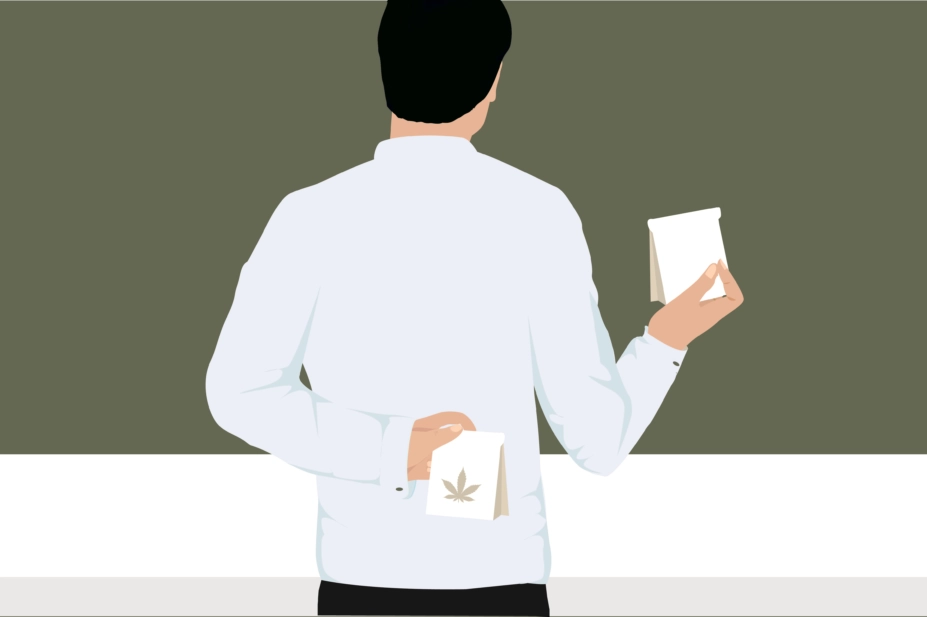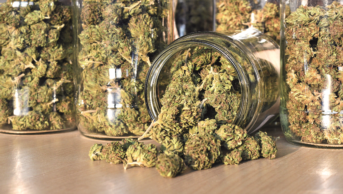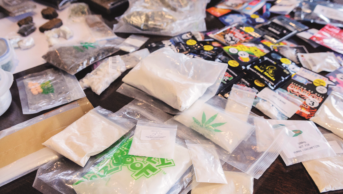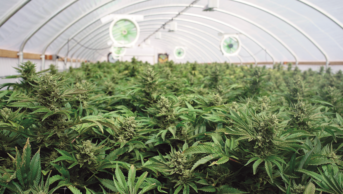
JL / The Pharmaceutical Journal
Thursday 1 November 2018 was a historic day — the day that the UK government changed its mind on the medical benefits of cannabis. Cannabis-based products for medicinal use moved from Schedule 1 to Schedule 2 of the Misuse of Drugs Regulations, meaning that they could be prescribed for any condition.
Around half a dozen prescriptions have been issued privately since medical cannabis was legalised, but most people cannot afford the costly price tag of private healthcare
I would have hoped that, more than four months later, the many thousands of people using cannabis for their medical needs in the UK would have turned from buying it illegally to obtaining the drug through the NHS[1]
. But how many people have been able to obtain an NHS prescription? As far as I am aware at the time of writing, not one, although data on prescribing are expected from NHS England by the end of March 2019. Admittedly, around half a dozen prescriptions have been issued privately since medical cannabis was legalised, which is a start, but most people cannot afford the costly price tag of private healthcare.
What went wrong?
The rescheduling of cannabis was the result of an extraordinary political battle, and let’s give credit to the politicians involved — namely Sajid Javid, home secretary, and Nick Hurd, minister of state at the Home Office — for listening to the public and the media, and acting on the groundswell of positive opinion.
But these politicians made one, probably inadvertent, mistake. They asked for guidance on prescribing for pain from the Royal College of Physicians (RCP), and for guidance on childhood epilepsy from the British Paediatric Neurology Association (BPNA). Neither body is known for being open minded or liberal.
The RCP said there was insufficient evidence to support prescriptions of cannabis for pain, contrary to the evidence and the published opinion of many bodies, such as the National Academies of Science, Engineering and Medicine, and even the UK government’s own chief medical adviser[2],[3],[4]
— an extraordinary statement. Extrapolation of statistics from areas of the United States in which cannabis is now legal suggests that the drug could prevent about 25% of opioid deaths in the UK[5]
, and no one has died from a cannabis overdose; so, on this basis, cannabis should be considered for managing chronic pain. Should we act now to save around 1,000 lives per year or should we wait for more evidence of efficacy from more double-blind trials to add to the trial evidence already collected, but potentially put lives at risk in doing so[5]
? Should we ignore the fact that between 250,000 and 500,000 people may use cannabis for their pain each day in the UK without a prescription[1]
? How many anecdotes are needed for the blinkered to sit up and take notice? Clearly more than half a million.
His seizures stopped completely when THC was added to his treatment
Meanwhile, the BPNA — perhaps grudgingly and as a last resort — said that Epidiolex (a pure cannabidiol [CBD] isolate; GW Pharmaceuticals, Cambridge) could be used for the treatment of childhood epilepsy as long as all other treatment avenues have been explored and brain surgery has been considered. What about the children who respond slightly to CBD but need tetrahydrocannabinol (THC) — the main psychoactive compound of cannabis — to help further?
Alfie Dingley, a child with epilepsy whose case helped to change the law, was given CBD, which reduced his seizures by around 50%. However, his seizures stopped completely when THC was added to his treatment; from 300 seizures each month, after trying all possible drugs, to zero seizures on CBD and THC. Other studies considering children with epilepsy, albeit small scale or observational, have also found benefit from a small amount of THC in the CBD full-extract product[6]
,[7]
. Still, the BPNA said that more evidence is needed. It also suggested that THC can damage developing brains[8]
, despite a lack of published evidence to support this.
Bureaucracy and ignorance
Doctors can ignore these guidelines from the RCP and the BPNA — after all, they are not mandatory. The trouble is, prescriptions for medical cannabis will need approval from the top of the hospital trust’s hierarchy; will a doctor be seen to go against trust leaders? Probably not. New, balanced and more realistic recommendations and guidance on prescribing cannabis from the Medical Cannabis Clinicians’ Society and the All-Party Parliamentary Group on Medical Cannabis under Prescription, published on 20 March 2019, should provide clarity across the hierarchy. Guidance from the National Institute for Health and Care Excellence will be out for consultation in July 2019.
The UK supply chain poses a logistical barrier to prescriptions
What else prevents prescription? Another good reason is that some doctors are ignorant about the benefits of cannabis, which is understandable. Many were not taught about cannabis in a treatment context in medical school, and they may have a poor understanding of the endocannabinoid system. Society once told them that the plant is a ‘bad’ thing and now, all of a sudden, it has become a ‘good’ thing. I would not want my doctor to prescribe something about which they knew very little — especially if they had no idea what dose, type or form of cannabis to recommend. For these reasons, education is extremely important, and it has to start somewhere. We need only a core of around 100 doctors trained in the medical benefits of cannabis products, and how to prescribe them, to work alongside other health professionals in regional centres to start normalising cannabis prescriptions.
Unlicensed and unavailable
Another, similarly justified, reason for a lack of cannabis prescriptions is that the vast majority of medical cannabis products are unlicensed (only one product — Sativex — is licensed, but it has a very restricted label). This means that the prescriber has to take full responsibility for the prescription and is in the firing line for legal action if something goes wrong. I am not a lawyer, but it seems to me that if a prescriber weighs up the evidence, takes into account the guidelines and acts in the best interest of the patient, successful action against the prescriber seems unlikely. Medical cannabis is remarkably safe with very few contraindications, but if you know the contraindications and prescribe sensibly, all should be well.
The UK supply chain poses a logistical barrier to prescriptions, too. Anecdotally, it is very difficult to access medical cannabis in any sensible timescale at the moment. In this case, the pharmacist needs to apply to the Medicines and Healthcare products Regulatory Agency (MHRA) for an import licence, which could take 28 days, and the supplier (probably in Canada or The Netherlands) must apply for an export licence, which could take at least 8 weeks). The supply is granted for only one month — although I gather that longer periods may be allowed in exceptional circumstances, such as life-threatening emergencies — so this process would need to be repeated for treatment courses that are longer than four weeks. Once more prescriptions are issued by prescribers in the UK, I hope that this situation will improve, but we should develop a medical cannabis industry in the UK, rather than rely on importation.
It is worth remembering that CBD products are widely accessible in health food shops and online in the UK, but legislation around the products is open to interpretation. While it is widely reported that CBD products are legal if they contain less than 0.2% THC, guidance from the Home Office advises that any trace of THC — a controlled drug — could render the products subject to legal control. However, the CBD industry is still thriving. The MHRA is clear that products containing CBD which are used for medicinal purposes are medicines, and that they must have a product licence, so many suppliers instead sell their products as ‘food supplements’ and are unable to make medical claims for them. This is not satisfactory. We need more controls to ensure consistency for people buying these products to use as medicines.
We may have won the political battle for medical cannabis, but we still need to win the medical one. We need better guidance for doctors and pharmacists, more comprehensive education and a bit of common sense. Yes, we do need more study evidence, but we should be prescribing this safe and widely used medicine while we are learning more about its properties.
Mike Barnes, consultant neurologist and honorary professor of neurological rehabilitation, Newcastle University
Conflict of interest: Mike Barnes is chief medical officer at European Cannabis Holdings and Sol Global Investments; director of education at the Academy of Medical Cannabis; chair of the Medical Cannabis Clinicians’ Society; and clinical director of the Medical Cannabis Clinics Ltd, the UK’s first private cannabis clinic.
A spokesperson for the Royal College of Physicians said: “We believe that our recommendations reflect the current evidence base but, as we have previously stated, we will review these periodically until such time as the National Institute for Health and Care Excellence publishes guidance in October 2019. Our regulatory system correctly has a range of checks and balances in place to reduce the risks that accompany new medicines. The experiences of the introduction of thalidomide and rofecoxib, which were insufficiently assessed, highlight the importance of ensuring that we approach new medicines with caution.”
A spokesperson for the British Paediatric Neurology Association (BPNA) said: “Prescribing policy should not be determined by anecdotal case reports or by open-label non-randomised trials. The BPNA welcomes the rescheduling of cannabis-derived medicinal products as this now allows essential research to be undertaken. The BPNA remains committed to the practice of evidence-based medicine.”
- On 20 March 2019, this article was updated to acknowledge the publication of guidance of ‘Recommendations and Guidance on Medical Cannabis under Prescription’ by the Medical Cannabis Clinicians’ Society and the All Party Parliamentary Group on Medical Cannabis under Prescription.
- On 10 April 2019, this article was amended to clarify the law regarding CBD products. The article originally stated that CBD-based products containing less than 0.2% THC are legal; however, guidance from the Home Office advises caution, “that is, that a CBD-containing product would be controlled under the [Misuse of Drugs Act 1971 / The Misuse of Drugs Regulations 2001 as a result of its other cannabinoid content.”
References
[1] United Patients Alliance. UK medicinal and recreational cannabis public poll — results. 2018. Available at: https://www.upalliance.org/newsmediainternal/2018/10/29/populus-cannabis-poll-results (accessed March 2019)
[2] Royal College of Physicians. Recommendations on cannabis-based products for medicinal use. 2018. Available at: https://www.rcplondon.ac.uk/file/11035/download?token=srC-KCdx (accessed March 2019)
[3] Abrams DI. The therapeutic effects of cannabis and cannabinoids: an update from the National Academies of Sciences, Engineering and Medicine report. Eur J Intern Med 2018;49:7–11. doi: 10.1016/j.ejim.2018.01.003
[4] Davies S. Cannabis scheduling review part 1: the therapeutic and medicinal benefits of cannabis-based products. 2018. Available at: https://www.gov.uk/government/publications/cannabis-scheduling-review-part-1 (accessed March 2019)
[5] Bachhuber MA, Saloner B, Cunningham CO et al. Medical cannabis laws and opioid analgesic overdose mortality in the United States, 1999–2010. JAMA Intern Med 174(10):1668–1673. doi: 10.1001/jamainternmed.2014.4005
[6] McCoy B, Wang L, Zak M et al. A prospective open-label trial of a CBD/THC cannabis oil in Dravet syndrome. Ann Clin Transl Neurol 2018;5(9):1077–Â1088. doi: 10.1002/acn3.621
[7] Pamplona FA, da Silva LR & Coan AC. Potential clinical benefits of CBD-rich cannabis extracts over purified CBD in treatment-resistant epilepsy: observational data meta-analysis. Front Neurol 2018;9:759. doi: 10.3389/fneur.2018.00759
[8] British Paediatric Neurology Association. BPNA statement on use of marijuana (cannabis) related products in the treatment of complex epilepsies. 2018. Available at: https://bpna.org.uk/_common/show_unpro_doc.php?doc=BPNACannabisstatement04072018_d77089aff4d12b0f421b615fbadec20b.pdf (accessed March 2019)


